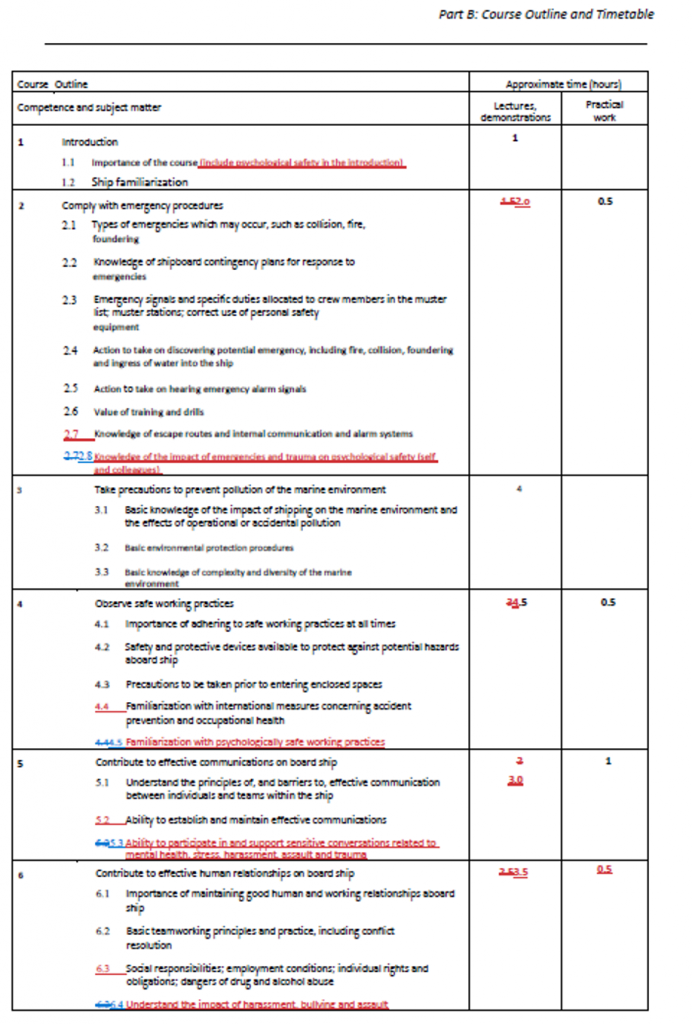Meeting Minutes: COPE° Working group on Psychological Safety and Sexual Assault and Harassment in the Maritime Sector
TUES, MARCH 15, 2022 | 6:00 AM ET
1) Welcome
There was confusion around what time this meeting was scheduled for. Because of the many different time zones of the participants, this meeting was scheduled at 22.00 CET. A structured approach was proposed to avoid confusion about scheduled meeting times moving forward.
Participants of this meeting introduced themselves to get to know each other a little better.
2) Introduction of the Participants
The “List of participants” provided in Annex A of the meeting minutes from our previous session was presented. No further comments were given. It was decided that new applicants and interested people of this working group are going to be asked to send a short message containing their intentions, visions and introduction of themselves via email. We will then review those applicants’ applications in our next meeting and decide if those applicants are invited to join.
Current members of the group are invited to introduce persons who they think can contribute to the work on the group at any stage.
3) Activities
a) TERMS OF REFERENCE
The terms of reference as mentioned in Annex B: “Terms of reference” of the meeting notes were discussed and agreed upon by the group.
Discussion led to the decision to add the term “Acceptance” to diversity, equality, equity, and inclusion.
It was further noted that using the UN framework in a broader scope than just the IMO is a great idea. In this regard it was mentioned that we invited ILO to join this working group. ILO indicated they were excited about the work this group is doing but are still assessing whether or not to join. We are not sure about the reasons for this and will keep close communication with ILO with regards to the resources and information they are sharing.
The Terms of reference are to be uploaded on the COPE° website for documentation.
b) SCOPE OF WORK
Activities the COPE° working group will be focusing on was discussed in reviewing the Scope of work:
- Review and amend existing IMO model course 1.21 – Personal Safety and Social Responsibility
As proposed in document MSC105/16/4, submitted to IMO Maritime Safety Committee in 2022 by Dominica, Turkey, Saudi Arabia, InterManager, IIMA, ICHCA International, IFSMA, AMPP. - Evaluate and provide training options
Designing courses on NEMO, available free of charge. Investigating other training options, taking into account minimum standards and advanced standards. Listing out different kinds of outputs for parties to consider and opportunities for user groups. - Harmonizing best practices and guidance documents, industry resources and studies
Amongst United Nations bodies (IMO and ILO); NGO diversity manuals such as ICS, WISTA, ISWAN, BIMCO, INTERTANKO, INTERCARGO and the World Shipping Council. How do we make sure this work is easily implemented into ISM manuals, company procedures, etc.? - Awareness and response
Output relevant for mariners and other maritime professionals will be shared online by means on different channels. The working group will be open to hear the voice of the industry and take information into consideration. There will be an emphasis on ensuring that information shared is reliable and accurate.
c) SUB-GROUP ON IMO MODEL COURSE 1.21 PSSR
The first sub-group started to work on the IMO Model Course 1.21 on Personal Safety and Social Responsibility. The work is outlined and described in Annex C: “Activity 1 – Review of IMO Model Course 1.21 – Personal Safety and Social Responsibility.” The group updated the entire working group on the work of this sub-group.
The meeting proposed the sub-group to look into implementing language about the health impact of insufficient daylight and fatigue. Another subject to consider and discuss is the social aspect of sharing time around a meal on board. Not only does the quality of food have an impact on peoples’ health, but also the social interactions had during meals.
The meeting discussed the need for a reporting mechanism about SASH and unacceptable behavior, also questioning whether the group should consider inserting this into the group’s scope of work.
- Could we investigate what is currently out there with regard to the means of reporting SASH? What are the challenges, what is the role of port states, flag states, companies, organizations and authorities?
- Accountability guidance of ITF was mentioned, as well as the work of SaferWaves.
Ms. Jillian Carson-Jackson will inform members about the sub-working group’s next meeting in due time.
4) Decisions and Take-Aways
- Agreed upon and approved the Terms of Reference and scope of work
- Agreed to introduce new proposed members at next sessions
- Jillian Carson-Jackson will inform members about the sub-working group’s next meeting, where they will work on the IMO Model Course
- Add to the agenda of the next meeting: Investigate more about SASH reporting mechanisms, accountability, processes, responsibilities and guidance.
5) Next Meeting
Proposed to meet on Tuesday 12 April 2022.
ANNEX A
List of Members and Participants
The members and participates of the COPE° Working group on Psychological Safety and Sexual Assault and Harassment in the Maritime Sector are listed below.
*The information in the list is privacy sensitive, and thus will not be published here.*
ANNEX B
Terms of Reference
The COPE° Working group on Psychological Safety and Sexual Assault and Harassment in the Maritime Sector is hosted by Center for Ocean Policy and Economics, a subset of The Northeast Maritime Institute – College of Maritime Science. COPE° facilitates committed maritime government, non-government, corporate, education, science and technology experts and partners to collaborate and create drivers for change. Members of the working group will be sharing information, ideas, learnings and pooling resources in order to work on:
- developing and delivering relevant actions and impactful solutions
- drivers for change, in order to tackle the wicked problems present in our world today
- solutions to build on an international UN framework to connect the industry to objectives.
The work the COPE° working group will be driven by ethical and humanitarian based values, taking into account:
- building on a psychologically safe workplace culture in the maritime sector
- the successful integration of vulnerable and marginalized groups, in support of diversity, equality, equity, inclusion and acceptance
- the issues relating to sexual assault, harassment and bullying in the maritime sector
- transparency and integrity
- supporting and honoring mariners globally
ANNEX C
Activity 1 – Review of IMO Model Course 1.21 – Personal Safety and Social Responsibility
This sub-group will be chaired by Ms Jillian Carson-Jackson. The sub-group will update the main group on their work in the next meeting.
It is proposed that the existing model course is reviewed and amended in a stepwise approach:
- Step 1 – review and update the existing model course as an incremental revision, based on the proposals identified in Annex I. develop the revised course outline and teaching syllabus for Model Course 1.21
- Step 2 – review and consider amending the priority level 4 for the model course and, as appropriate, commence the full review as soon as possible taking into account the current workload for model course review and validation.
Noting the mature nature of IMO Model Course 1.21, and the focus on amending to expand existing training on safe working practices, effective communications on board ship, and effective human relationships on board ship to include elements of psychological safety and dealing with trauma and trauma response, it is proposed that Step 1 could be initiated following agreement at MSC 105, with the draft revised model course provided to HTW9 for validation.
The focus of the informal working group will be to provide the revision and provide content to the model course.
Points to consider:
- Action in case of human emergency/accident is not well covered.
- Action in case of personal crisis is not covered.
- Advantages of shipboard community (in time of cabin internet) needs to be expanded.
- Ethnicity culture & SASH needs to be addressed.
- Should we be looking at a Basic PSSR and an Advanced PSSR for the Management team?
ANNEX I


